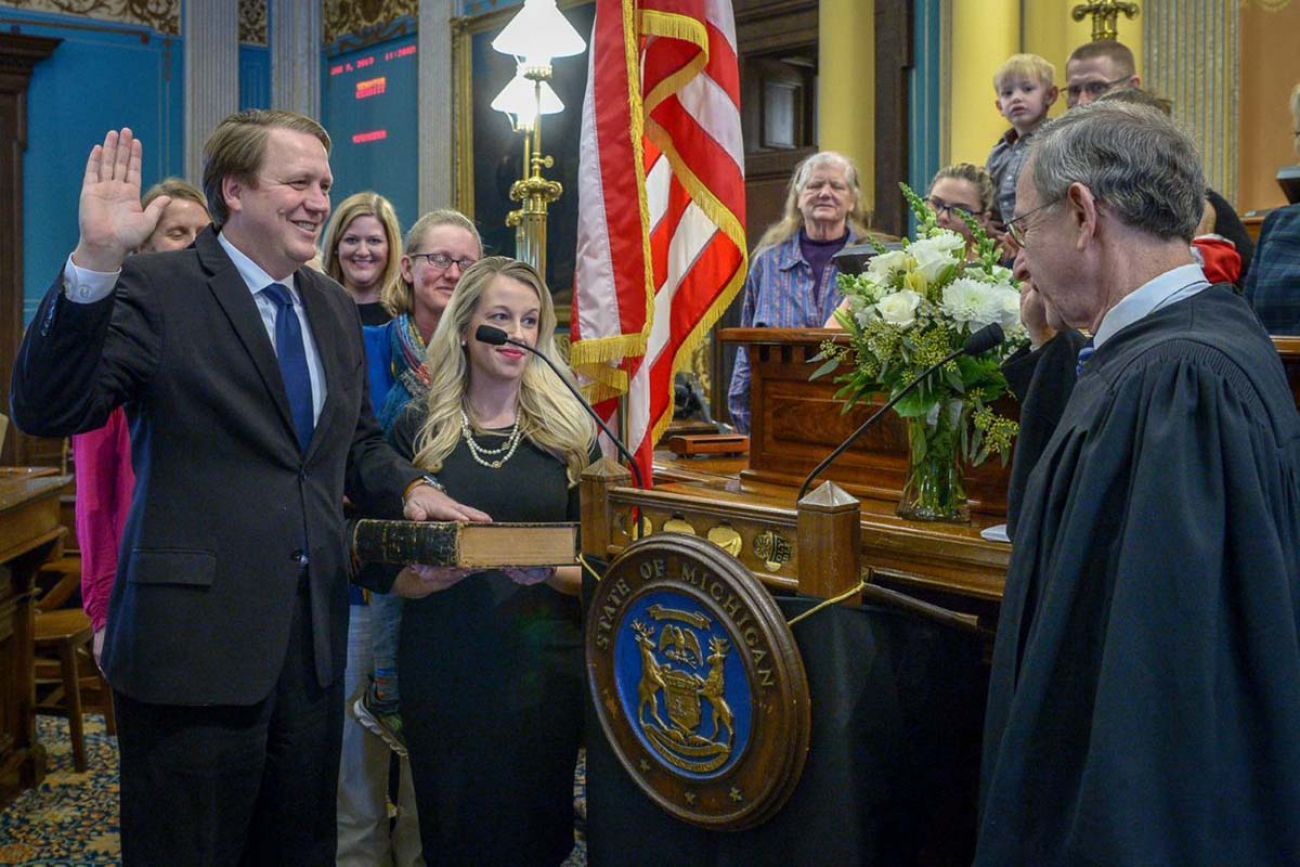Michigan Senate GOP leader: 2023 a year of ‘missed opportunity’

- Michigan Senate Minority Leader Aric Nesbitt contends Democrats pushed a ‘far left” agenda in 2023
- Nesbitt opposes business tax incentives and argues Michigan should bring back Right-to-Work law that Democrats repealed
- Senate GOP leader opposes paid sick leave mandate but suggests tax credit for employers that choose to provide
LANSING – This wasn’t the year Michigan state Sen. Aric Nesbitt had planned.
The Porter Township Republican’s hopes of serving as majority leader of the Senate were dashed last fall when Democrats eked out a two-seat majority by flipping the chamber for the first time in 40 years.
So instead, Nesbitt began his minority leader role with a vow to seek opportunities for bipartisanship in a closely-divided Legislature – something that happened all too infrequently, he told Bridge MIchigan in a year-end interview.
Nesbitt proved a critic of both Gov. Gretchen Whitmer and legislative Democrats, who used their clout to pass a series of sweeping new laws, including a union-backed repeal of the state’s Right-to-Work law.
But he was unable to advance a Republican agenda and contends this year’s legislative action did not accurately reflect the will of the politically divided state.
Below, you’ll find excerpts from a December interview with Nesbitt. Questions and answers have been edited for clarity and length.
Bridge Michigan: Democrats controlled the House, Senate and governor’s office this year for the first time in four decades. What did that mean for you, as a Republican leader in the Legislature?
Nesbitt: If I could describe this past year in a couple of words, it would be: “Missed opportunity.” And with this Democrat majority that pushed to start their Christmas break early, it seems like my description will remain accurate for the rest of the year. At every opportunity to work toward common-sense solutions in the middle, starting with the Earned Income Tax Credit and providing exemptions for senior income earlier this year, the Democrat majority made the conscious choice to sprint to the far left and do it as a partisan project instead of trying to reach across the aisle and work in a bipartisan way.
As you just mentioned, Democrats voted to expand the Earned Income Tax Credit, which was originally a Republican idea. And they repealed the so-called pension tax that several Republicans had promised to do in their own campaigns. How did that become partisan?
They wrapped it up into their corporate welfare package to cut the legs out from the Legislature from having any say in economic development over the next three years by having $500 million automatically (deposited into the governor’s business incentive program). She put it in along with stopping the income tax rollback, creating a shell game. There was a bipartisan vote for both the Earned Income Tax Credit and pension retirees getting some tax relief. Then all of a sudden, on the governor’s orders, the Legislature went through contortions to try to stop the income tax rollback, which we Republicans effectively still made happen.
(Editor’s note: Whitmer had proposed sending $180 rebate checks to Michigan taxpayers, which would have blocked a projected income tax rate rollback triggered by unusually high revenues during the COVID-19 pandemic. Republicans blocked the rebate checks to preserve the broader tax cut, which the Whitmer administration later declared would last only one year. Republicans have taken the fight to court in an attempt to make the rate rollback permanent.)
On economic development, there have been recent announcements that some of the state’s large incentive awards may be in flux as EV battery production slows down, prompting Ford to scale back a planned facility. How does that inform the ongoing policy debate in Lansing?
It’s market conditions. A lot of this is all mandated from either the federal level or out of California or other states and other countries. It's not about consumer demand in the marketplace. Let's allow the market to actually work and function. There's some really cool technology out there in the electric vehicle space. … But you had the federal government pass the “inflation explosion act” a few years ago that essentially threw billions and billions of dollars into these incentive packages for battery manufacturing. And you had Gov. Whitmer, instead of trying to diversify the economy, out trying to jump on every one of these. And what is it? Well, we see Indiana paying a tenth as much per job as Michigan as Gov. Whitmer continues to make it more expensive to do business.
Related Q&As:
Michigan House Speaker Joe Tate: 2023 ‘the most productive year’ ever
Michigan House GOP leader: Bipartisanship possible in 2024 if Dems want it
Top Michigan Senate Democrat: ‘Really pleased with results’ in 2023
Democrats are considering reforms to the governor’s business incentive program, which was originally created with a Republican-led Legislature. Are there potential reforms that might win some GOP support?
Let’s re-implement Right-to-Work. Let’s cut taxes instead of increasing taxes on small businesses…. Let’s concentrate on actually some things to make Michigan less expensive to build and reinvest in. Things like building infrastructure. Instead of passing this higher-price, lower reliability energy plan, let's have lower price and more reliable energy. Let's make sure that we get the Line 5 tunnel actually built and completed. There's a bunch of stuff that we can do to say we're open for business, but instead they spent the last year trying to give special handouts to the big labor bosses, to trial lawyers and the radical coastal environmentalists. And that’s not how you compete and win for jobs in the 21st century.
What are you expecting next year, given that Democrats aren't going to have a majority in the House for at least the first 3 ½ months of the year after two members won mayoral races. What are you looking forward to or worried about?
The budget surplus is gone. The Democrats frittered away a $9 billion surplus to ram stuff around the state. Nothing overly transformational. Republicans tried to fight for more spending on infrastructure, more spending on bridge work, underground infrastructure, state parks, and the Democrats said, “No, we're going to spend it on different priorities over there.”
Our economy and its growth need to be based on attracting more businesses here and making Michigan a place where people want to stay and raise a family.
I know we started on some financial disclosure — we got a bipartisan package through — but I do think we can go further on transparency issues and accountability for elected officials here in the state. I think we should be looking at (the Freedom of Information Act). Subjecting our legislature and governor to FOIA having the same requirements as local governments. … And there's some further financial disclosure that I think we need to be looking at in the coming years…
(On education), we need to stop repealing accountability measures, and I think we need to look at ways to actually provide choice and better outcomes and opportunities for families and students. We're seeing student enrollment decline in schools across the state of Michigan. So there are ways that we can look at some holistic reforms on encouraging some school districts to merge, having some back offices merge and trying to get some more fiscally prudent financial management systems in place instead of bailing out those that have mismanaged funds over the years.
Gov. Whitmer wanted the Legislature to create a statewide paid sick and family leave policy this year, but that did not happen. Is there any scenario where Republicans would work with Democrats on that sort of proposal?
A lot of larger companies offer some form of family medical leave policy. That's a positive. It's a competitive thing. We have a competitive marketplace that, if you want the best and brightest, you need to make sure you have the benefits that go along with it.…
But creating a brand-new tax — it’s a $2 billion tax — that goes out and creates a new copy and paste unemployment insurance agency department — and we've seen how unaccountable that the agency is over the last few years during COVID — is a recipe for disaster. It will increase costs and will not supply the kind of paid family medical leave that we're hoping that employers offer. And so what I've put out… is saying let's look at a plan to provide a tax credit for some of these smaller businesses that may not be able to afford to provide this, some charitable nonprofits or small businesses, instead of creating a brand new $2 billion payroll tax that the governor is pushing.
See what new members are saying about why they donated to Bridge Michigan:
- “In order for this information to be accurate and unbiased it must be underwritten by its readers, not by special interests.” - Larry S.
- “Not many other media sources report on the topics Bridge does.” - Susan B.
- “Your journalism is outstanding and rare these days.” - Mark S.
If you want to ensure the future of nonpartisan, nonprofit Michigan journalism, please become a member today. You, too, will be asked why you donated and maybe we'll feature your quote next time!




